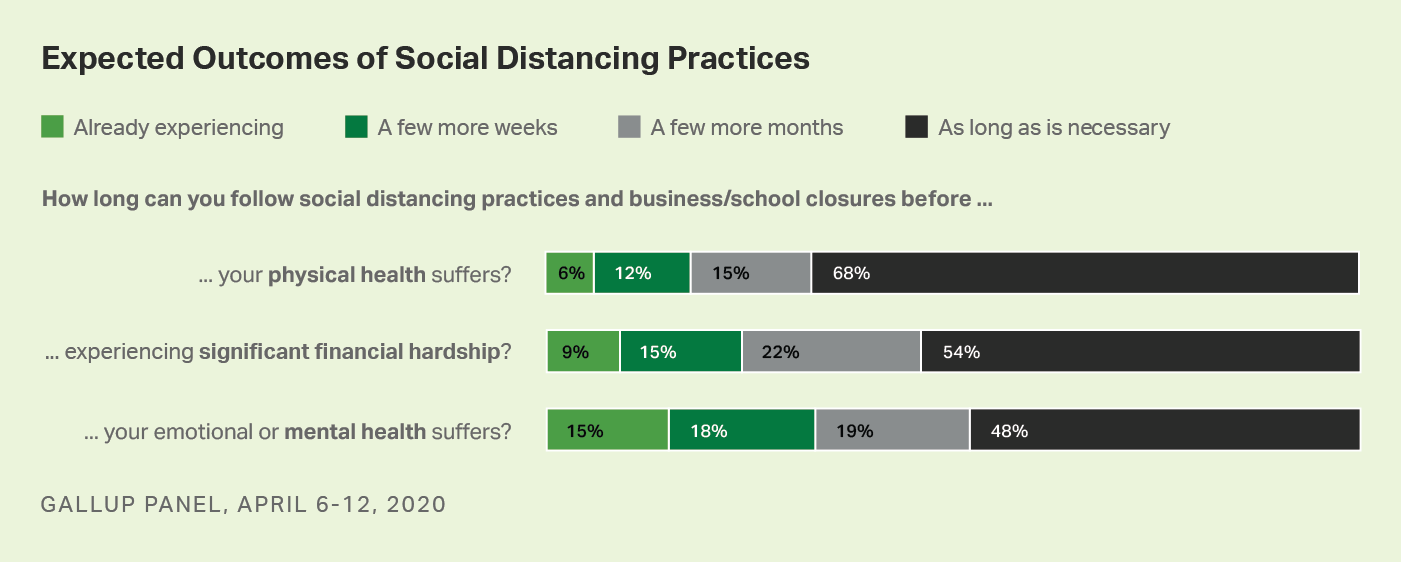Story Highlights
- 68% can wait "as long as is necessary" before physical health suffers
- 54% say the same about facing financial hardship; 48% about mental harm
- 26% of those aged 18 to 44 say their mental health is already suffering
WASHINGTON, D.C. -- Government and public health officials in the U.S. have begun discussing when to reopen society, but as social distancing directives persist and school and business shutdowns wear on, Americans indicate their mental health will suffer before their physical or financial health does.
Majorities in the U.S. say they can continue following social distancing guidelines for "as long as is necessary" before their physical health suffers (68%) or they experience significant financial hardship (54%). But fewer, 48%, say their mental health will hold out as long. Indeed, more say their mental health is already suffering (15%) as a result of COVID-19 social distancing than say the same of their physical (6%) or financial health (9%).

Just over one-quarter of Americans (27%) say they can follow social distancing guidelines for "a few more weeks" or "a few more months" before their physical health suffers, while 37% say the same for both their mental health and their finances.
These findings are based on an online, probability-based Gallup Panel survey conducted April 6-12. The federal government has recommended that social distancing guidelines continue through the end of April, and most states have orders in place until at least then. With some indications that the social distancing measures seem to be slowing the spread of the virus, state and federal leaders are beginning to ponder how to reopen society. The April 6-12 survey was completed just before seven East Coast governors announced they would band together to devise a plan for how and when to lift restrictions. Three West Coast governors quickly followed suit -- prompting a reaction from President Donald Trump, who insisted he alone has the authority to lift such restrictions.
Recent Gallup polling found that Americans are hesitant to return to their normal daily activities. Seven in 10 say that once restrictions are lifted, they will wait to see what happens with the coronavirus before resuming their normal activities, while 20% say they will resume them immediately.
Younger Americans Have Less Tolerance for Continued Restrictions
Those aged 18 to 44 are markedly more likely than their counterparts to say their emotional or mental health is already suffering from following social distancing guidelines -- 26% say as much, compared with 9% of 45- to 64-year-olds and 5% of those aged 65 and older. Likewise, 10% of these younger Americans say their physical health is already suffering, while fewer in older age groups agree. Those in the youngest age brackets are also more likely to say they are already experiencing financial hardship.
Older Americans are more likely than those who are younger to say they can follow social distancing practices as long as is necessary before their financial, mental and physical health suffer. Older adults may be more patient because they know their health risks are higher than those for younger adults should they contract COVID-19. They are also more likely to be retired and on a fixed income, which might make them somewhat less financially vulnerable.
| Already experiencing | A few more weeks | A few more months | As long as is necessary | |||||||||||||||||||||||||||||||||||||||||||||||||||||||||||||||||||||||||||||||||||||||||||||||||
|---|---|---|---|---|---|---|---|---|---|---|---|---|---|---|---|---|---|---|---|---|---|---|---|---|---|---|---|---|---|---|---|---|---|---|---|---|---|---|---|---|---|---|---|---|---|---|---|---|---|---|---|---|---|---|---|---|---|---|---|---|---|---|---|---|---|---|---|---|---|---|---|---|---|---|---|---|---|---|---|---|---|---|---|---|---|---|---|---|---|---|---|---|---|---|---|---|---|---|---|---|
| % | % | % | % | |||||||||||||||||||||||||||||||||||||||||||||||||||||||||||||||||||||||||||||||||||||||||||||||||
| ... your emotional or mental health suffers? | ||||||||||||||||||||||||||||||||||||||||||||||||||||||||||||||||||||||||||||||||||||||||||||||||||||
| 18-44 | 26 | 18 | 21 | 35 | ||||||||||||||||||||||||||||||||||||||||||||||||||||||||||||||||||||||||||||||||||||||||||||||||
| 45-64 | 9 | 19 | 17 | 56 | ||||||||||||||||||||||||||||||||||||||||||||||||||||||||||||||||||||||||||||||||||||||||||||||||
| 65+ | 5 | 16 | 18 | 62 | ||||||||||||||||||||||||||||||||||||||||||||||||||||||||||||||||||||||||||||||||||||||||||||||||
| ... experiencing significant financial hardship? | ||||||||||||||||||||||||||||||||||||||||||||||||||||||||||||||||||||||||||||||||||||||||||||||||||||
| 18-44 | 12 | 15 | 22 | 50 | ||||||||||||||||||||||||||||||||||||||||||||||||||||||||||||||||||||||||||||||||||||||||||||||||
| 45-64 | 10 | 19 | 24 | 47 | ||||||||||||||||||||||||||||||||||||||||||||||||||||||||||||||||||||||||||||||||||||||||||||||||
| 65+ | 2 | 8 | 20 | 70 | ||||||||||||||||||||||||||||||||||||||||||||||||||||||||||||||||||||||||||||||||||||||||||||||||
| ... your physical health suffers? | ||||||||||||||||||||||||||||||||||||||||||||||||||||||||||||||||||||||||||||||||||||||||||||||||||||
| 18 | 10 | 12 | 15 | 63 | ||||||||||||||||||||||||||||||||||||||||||||||||||||||||||||||||||||||||||||||||||||||||||||||||
| 45-64 | 4 | 13 | 11 | 72 | ||||||||||||||||||||||||||||||||||||||||||||||||||||||||||||||||||||||||||||||||||||||||||||||||
| 65+ | 2 | 7 | 18 | 72 | ||||||||||||||||||||||||||||||||||||||||||||||||||||||||||||||||||||||||||||||||||||||||||||||||
| GALLUP PANEL, APRIL 6-12, 2020 | ||||||||||||||||||||||||||||||||||||||||||||||||||||||||||||||||||||||||||||||||||||||||||||||||||||
Some additional differences in Americans' opinions of how long they can follow social distancing guidelines before experiencing detrimental effects are detailed below, and provided in the accompanying detailed tabulations (PDF download).
Demographic Differences in Financial Hardship
- Twenty-one percent of Americans with an annual household income of less than $36,000 say they are already experiencing financial hardship. This is more than double those in the $36,000 to $89,999 income bracket (9%) and more than five times those in the $90,000 or more bracket (4%). Also, 45% of those in the lowest income category say they can continue social distancing as long as is necessary before experiencing financial hardship, but significantly more in the higher income categories agree.
- Parents of children younger than 18 are twice as likely as those without minor children at home to say they are already experiencing negative financial effects (14% vs. 7%, respectively). Parents of minor children (46%) are also less likely than their counterparts (57%) to say they can wait as long as necessary for restrictions to be lifted before being burdened financially.
- Americans who rent their home (13%) are more likely than homeowners (7%) to say they are already having financial trouble. Homeowners are more likely than renters to say they can wait as long as needed before they suffer financially (57% vs. 49%, respectively). This may be due to the fact that the federal government has ordered lenders to allow Americans with federally backed mortgages to suspend their payments if they are having financial difficulties.
Demographic Differences in Emotional and Mental Health
- About one-fifth of women (19%) say they are already experiencing negative emotional or mental health effects from social distancing, while 12% of men say the same. Men (53%) are more likely than women (43%) to say they can continue social distancing as long as is necessary before their mental health suffers.
- The same pattern is seen in the views of parents with minor children -- 20% say they are already having trouble with their mental health, compared with 13% of those with no younger children at home. Fifty-one percent of those without minor children think they can last as long as necessary without their mental state being affected, while 41% of parents agree.
- Americans who are working are more likely to report negative emotional effects than those who are not working -- 18% vs. 12%, respectively. Those who are not currently employed (56%) indicate they may have more stamina than working adults (43%) when it comes to avoiding negative mental health effects of social distancing.
Learn more about how the Gallup Panel works.




